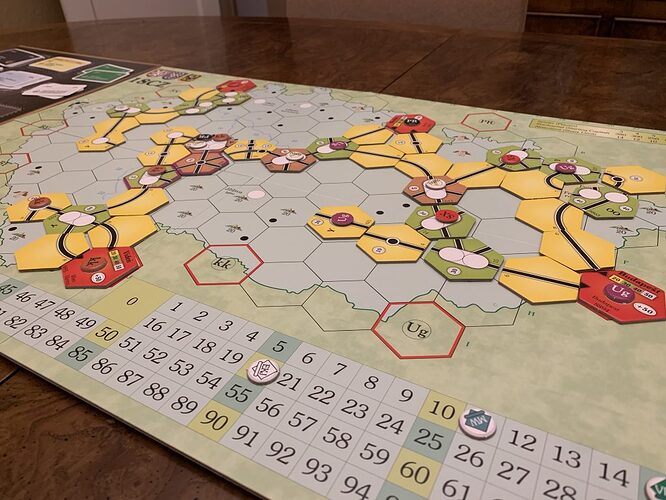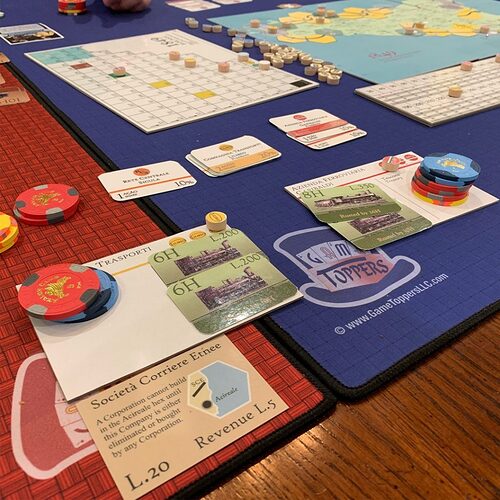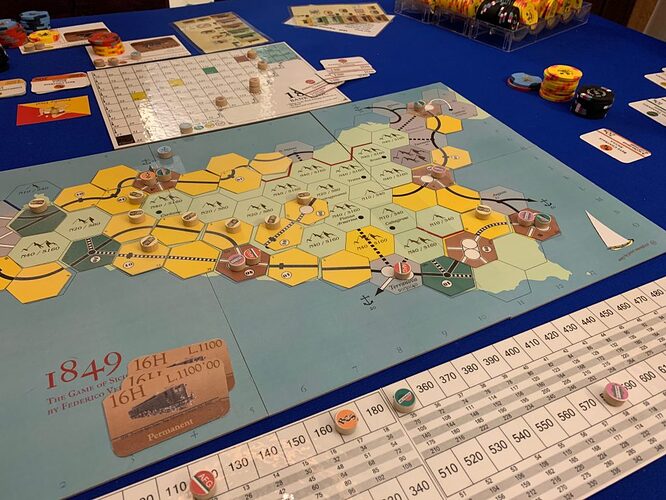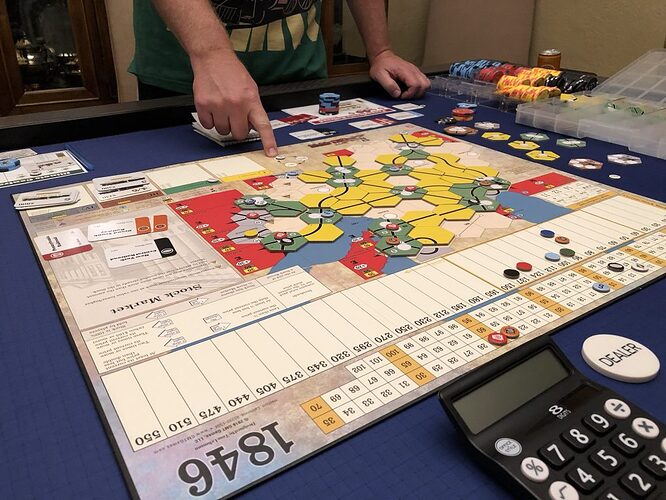Originally published at: https://statelyplay.com/2019/03/21/18xx-or-how-i-learned-to-stop-playing-euros-and-love-the-train/
I’ve been playing board games since the Reagan administration and, in that time, my tastes have ebbed and flowed from tabletop RPGs to euros to wargames to DOAM to…whatever. I fell in love with deckbuilding when it was the big thing, and then wouldn’t pass up a worker placement game even if the theme was exciting as toenail fungus. I bought every damn Savage Worlds and Deadlands rulebook and read them back-and-forth until I realized I’d never find anyone to play it with me and moved, instead, into engine building and resource management. I devoured every new title I could find for fear of not getting a chance to play “the next big thing”, and I relished with delight the most sought after and delectable European morsel: the Victory Point.
Then I played 1889. The conversion wasn’t instantaneous, but the past five years have led me to an inexorable conclusion: 18xx is the greatest game on the planet.
I’m sure that most of you reject the premise of this article and didn’t even click past the break, but for those of you who did, thanks. Now, let’s talk some 18xx.
First of all, while I’m starting to come to the conclusion that I may never want to play a game from outside the 18xx system again [this is a lie, Dave still plays a bunch of other games and enjoys them. Some of them don’t even have trains in them. -ed.], I understand that this is just me. I don’t expect 18xx to be everyone’s cup of tea, and I certainly wouldn’t condemn anyone for disagreeing with said conclusion. After all, the game I mentioned earlier, 1889, has a much longer title: 1889 The History of Skikoku Railways. If that’s not dry enough to make you never want to play an 18xx game, then you passed the test.
18CZ, the second-most fun I’ve had in the Czech Republic.I can’t gush about my love of the genre without a little background into just what 18xx is. I think many gamers hear 18xx and have an image in their head of an incredibly complex and dull slog being played by sweaty, fat, old men. I can assure you that only the last one is accurate, and only when I’m playing. At its core, 18xx is a relatively simple game. You buy and sell stock, build track, and collect money based on how many revenue generating locations (cities or towns) your locomotive can reach. Repeat this until the bank runs out of money or someone starts crying. Rules-wise, it’s all very simple. The complexity comes in the timing.
Timing is everything in 18xx and it mostly revolves around trains ‘rusting’. This is when your locomotives are too outdated to run, so they need to be scrapped. If you either didn’t plan very well or just didn’t time your early exit from a company’s presidency, you’re stuck with the bill of buying new trains. This, usually, removes any chance you have of winning and, in certain 18xx games, could signal game’s end. You can go bankrupt in 18xx, and that often means game over, with you in last place.
18xx is a business simulation steeped in the history of the year on the game box. You’ll find actual, real-life companies with their actual, real-life locations on maps of actual, real-life places. You and your soon-to-be ex-friends are barons starting with a fortune and, maybe, a private company or two of your own. The goal: use this new steam-powered invention to propel you to an even bigger fortune, or at least bigger than everyone else at the table.
Each game of 18xx (I’m going to say this a lot. What I mean is, of the 18xx games I’ve played, this is how they work. There are so many different ones out there, I’m sure there are at least a few that don’t stick to these basics) begins with an auction. Here, you’ll risk your starting capital to buy what are referred to as “privates”. Feel free to make jokes about your privates as the game goes on. We’ll forgive you.
Are you looking at my privates?Private companies are the 18xx equivalent of “variable player powers”. Each one will offer something to its owner, be it a cash influx every turn or an advantage somewhere in else in the game. For example, a private company might be a mining company that allows you to build tunnels cheaper than other players or it might offer you access to a hex on the board that no other company can enter (here it would represent a small, local railway that services that hex and would need to be bought out by a larger company so they could use it’s track).
Once the initial auction is completed, we enter the meat and potatoes of 18xx: alternating Stock and Operating Rounds. Stock rounds are easy. This is where players can sell and buy stocks, in that order. The first stock that must be purchased for each company is worth 20% of the shares and is called the Director’s Certificate. Purchasing it makes you, wait for it, the Director. You’re the owner of a company! Well, kind of. There are two kinds of 18xx games, those in which you’re company immediately floats and those in which it doesn’t float unless at least a certain amount of shares are sold.
Some explanation. To ‘float’ a company means that it’s open for business. In some games the stock market works intuitively: you buy the Director’s certificate and the money for that goes into that company’s treasury. As shares get bought, the money for each share goes into the company’s pocket. (something important to note: each player has their own, personal funds and each company has their funds. The two shall never mingle and the only thing that counts at the end of the game is what’s in your pocket, not your company’s. If you want a euro example of this in action, check out Imperial. A fantastic game in which your funds and your country’s funds are always separated.) Thus, you start out with a little money in the company purse, and it will grow as you and others realize what a dashing and profitable rail baron you are, and buy shares to ride your coattails. The other kind of company doesn’t float at all until 50-60% (it differs based on which 18xx game you’re playing) are bought. So, you can buy the Director’s certificate, but that company doesn’t yet exist, at least not anywhere but the stock market. Once the magic number of shares are bought, however, the company fully capitalizes. That is, they get the full amount of money in their treasury that they would if all the shares were bought. For example, let’s say there are 10 shares overall. I buy the Director’s share and set the price at $75/share. The Director’s share is worth 20%, so once 3-4 more shares are bought, the company floats and I recieve $750 in the treasury, even though there are still 3-4 shares in the bank.
16H trains…mamma mia!None of this is actually all that important, but it makes me happy to type it so you’re paying the price.
After everyone passes in a Stock round, the Operating Round(s) begin. Here, the Director of each floated company will place track. Buy locomotives, and rake in the dough. You earn money by how many cities/towns your train route passes through, and that number is limited by the current locomotive technology you have. For example, many 18xx games open with a ‘2’ train. This means that it can hit a total of 2 cities/towns, and that’s it. Thus, buying new trains and building stations to expand your network is the best way to increase your revenue each turn.
The biggest decision for each Director is what to do with that revenue. There are two options: pay dividends or withhold. Paying dividends just means that everyone who owns stock in your company gets a percentage of that revenue to put in their personal stash. Withholding is keeping all the revenue and putting it in the company treasury. This gives your company much-needed capital (after it floats, it’s really the only way to get more money in the company kitty), but the stockholders are mad and your share price will drop.
Then it’s back to a Stock round, rinse and repeat until the bank breaks (most 18xx games have a starting amount of cash in the bank and when it’s gone, the game ends) or someone goes bankrupt (some games end when a player goes bankrupt, others keep going forcing that poor sap so sit and wallow in their poverty).
I think my love of 18xx games started well before that fateful play of 1889. Instead, it started years before with games like Steam, Brass, and Automobile, all games from the evil mind of Martin Wallace. While the rules vary from not-too-complex to very-complex between these gems, the one trait they all share is brutality. Make a mistake and you’re going to pay, often literally via the much dreaded loan. While a younger me would have been put off by games without a safety net or strong catch-up mechanism, I now find it exhilarating. Even when you’re the one laying broken and bleeding, figuring out where it all went wrong is a puzzle worth solving.
Since 1889, I’ve played a bunch of different 18xx titles each with their own quirks and foibles that make them unique, even though the underlying system is identical. Part of the fun of 18xx is putting a new title on the table and seeing how the designer has managed to create something entirely new and yet entirely familiar.
I’m making it sound like I’m a pro and this. I’m a neophyte. I’ve only been in the 18xx game for 5 years and, over that time, have only played 8 of the countless 18xx variations out there. It’s not for a lack of trying, but 18xx are a small enough niche that you can’ t just go out to your local FLGS and pick them up. Well, not most of them. Instead, you have to go through a byzantine process of ordering games from companies that then hand-craft them for you. The queues can be intimidating. For example, I ordered 3 new games last June from one of main places that pop out 18xx titles, and mine are still in the queue. I only have 3-4 people in front of me now, but I don’t expect I’ll see physical copies until May or June. On top of that, they’re expensive as hell. The cheap ones are $100, creating a barrier to entry for most people above and beyond the stigma of complexity.
Calculators are not an option.Still, it’s a genre that I hope everyone at least gives a go. At least once. Yes, you’ll need to block off an entire day for that first game, and, yes, you’ll probably experience the most AP you’ve ever encountered. Still, there’s nothing else quite like 18xx out there and, if done right, can change your gaming life. Just don’t forget to bring a calculator.



